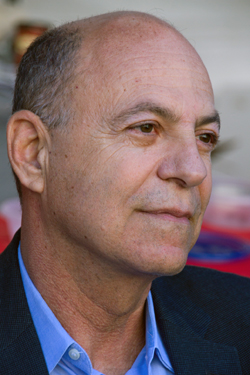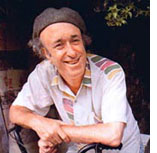By Danny Bloom


CHIAYI CITY, Taiwan — When I read in the local newspapers here that a Jewish novelist born in 1950 in Guatemala was coming to Taipei to attend the recent Taipei book fair as a guest speaker, I quickly sat down and typed out an email and asked if I could interview him for this website. In internet time, David Unger said yes and “abrazo”–the warm hug given by Latinos in greeting– and I started doing my homework.
Unger was born in Guatemala, I learned, the son of a German immigrant who fled Hitler’s Europe. He spent the first five years of his life in Guatemala, learning to speak Spanish and being part of a small Jewish community there. More on that later.
When Unger was five, the family moved to the U.S. and he grew up on the East Coast to attend the University of Massachusetts and get an MFA in writing from Columbia University. He now teaches at the City College of New York and serves as the U.S. representative of the International Book Fair of Guadalajara in Mexico. He writes novels, he translates novels and he lives in Brooklyn with his wife, the artist Anne Gilman.
With his first novel in 2004, Life in the Damn Tropics, Unger began making a name for himself in both Spanish and English-language media with his sharp portrayal of Guatemalan society and culture. In our email exhcange, Unger told San Diego Jewish World some good stories about “the writing life.”
“My first novel, ‘Life in the Damn Tropics’, was initially published by Syracuse University Press and was supposed to initiate their America Series,” he said. “The acquiring editor quit, my novel was ‘orphaned,’ as it were, and finally shoehorned into its Library of Modern Jewish Literature slot alongside the work of mostly Hebrew or Yiddish authors. It was really a poor fit since the protagonist of my novel was a kind of irreverent, anti-hero, and not really a model Jewish figure.”
“In Guatemala, the Jewish community was pretty upset because the novel drew attention to its existence, and the portrayal of it was not uplifting — it showed that the Jewish community was similar to any other community trying to survive during a moment of extreme pressure,” Under said. “Oddly enough, a Peruvian Gentile woman who lives in the U.S. said to me, with tears in her eyes, that my novel captured [exactly] her life and her struggles: all this leads me to believe that universality is always the mark of a successful novel, something that I aspire to writing.”
Unger has seen the ups and downs of life in the publishing industry, and he tells this story to illustrate some of what he has experienced as a Jewish writer trying to introduce his novels to Israel in Hebrew translations.
When I asked him about how an Israeli editor rejected two of his English-language novels, Unger explained: “The first thing to say about editors who reject a novel is that they rarely tell you the truth; it may be that this particular Israeli editor simply didn’t like my novel The Price of Escape, which is mostly set in Guatemala on the eve of World War II. What he said to me is that Israelis were not interested in fiction that dealt in themes related to the Holocaust, and if I were to write a novel that dealt more specifically with non-Jews set in Guatemala that he would be more interested. Well, when I offered him another novel I have written titled In My Eyes, You Are Beautiful, which is set in Guatemala and Mexico, that same Israeli editor was no more interested in seeing that novel either. Go figure.”
By the way, a new Unger novel titled “The Mastermind” is set in Guatemala in 2009, and it’s what one might call a political thriller. Abrazo, David Unger!
*
Danny Bloom is Taiwan correspondent for San Diego Jewish World and an inveterate surfer of the web. He may be contacted at dan.bloom@sdjewishworld.com